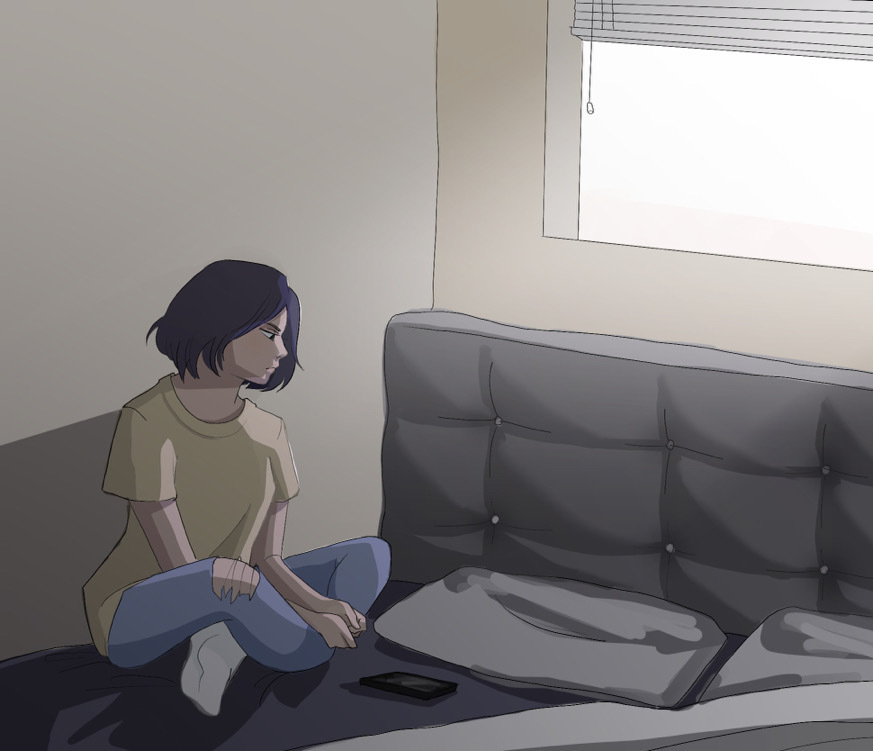The Complexity of Grief
A year of life in a pandemic has many people experiencing an unexpected emotion: Grief
Mar 16, 2021
Many times when we think of grief we picture losing a loved one, but grief can also occur after an extreme change. The COVID-19 pandemic has caused the closure of schools, dance studios, restaurants, places of worship and has restricted the ability for school sports to continue. While many of these activities were made virtual or are being brought back slowly, objectively not much has changed since last March. Returning to school is a step towards normalcy, but not all students are returning or will be relieved of their grief immediately.
With the one-year mark since the beginning of COVID-19 quarantine coming up, it is natural for us to feel upset that we are still in a pandemic and doing most of our activities virtually.
“Some words I would use [to describe my feelings about the pandemic] are frustrated, bored, repetitive, unusual,” junior Leah Forde said.
According to whatsyourgrief.com, there are seven types of grief relevant to the world’s current situation. Many students are possibly experiencing a “Non-death loss” which occurs when someone is grieving anything significant to their physical and psychological lives. There is also: “secondary loss”, “ambiguous loss”, “cumulative loss”, “nonfinite loss”, “anticipatory grief” and “disenfranchised grief”.
Also, contrary to what is often shown in movies, television shows and books, grief is not a simple five-step checklist of stages, it is a long and non-linear process.
“Grief is messy, and it’s all over the place. And it doesn’t exist in five stages,” local M.S., Licensed Marriage and Family therapist Kellie Canady said. “It kind of exists as a fluid process where we can feel really sad and in grief one day, and feel okay the next day.”
While grief is not a predictable process, it does not mean that people can’t experience denial and finally accept their situation; however, grief may not happen in a specific order of steps or disappear after a week. Everyone experiences and processes grief adversely.
Many students experienced grief when online school began due to the loss of a daily routine and social interaction, but many are still experiencing this same process of grief especially as this has been the reality of our lives for almost one whole year.
“The feeling of grief has been very common this year and not just because things were closed but many of our families experienced serious health issues,” Thousand Oaks High School counselor Daniel Solis said.
While processing grief is different from person to person, finding healthy ways to cope is a necessity for anyone dealing with loss.
“…allowing space for the feelings, whatever those feelings are their sadness, melancholy, anger, you know, just making room to feel whatever you are authentically feeling and having a support system,” Canady said.
She also recommends having a way of externalizing emotions. Talking to family members, friends and journaling are all safe and viable options to help process grief caused by the pandemic.
“[At the start of quarantine] I would have given myself advice to workout every day, keep a good mindset to achieve anything,” junior Makayla Swain said.
Those struggling with finding ways to cope with the pandemic can also refer to the Conejo Valley Unified School District website, where there are various resources for students and parents including emergency hotlines. CVUSD also offers a “Virtual Wellness Room” where students can enjoy calming music, sounds and videos.
“I would encourage any student struggling to of course, as I mentioned, reach out to their school counselor and trusted adults,” Thousand Oaks High School counselor Priscilla Montero said. “We all need support during this time.”
Aside from dealing with everyday grief from the pandemic, with holidays and milestones such as birthdays occurring throughout the pandemic, students may find it difficult to keep their spirits up. It is recommended by OurHouse Grief support center to try and maintain as many traditions as possible while doing so safely of course. The COVID-19 section of their website provides many useful PDFs and videos on how to feel supported and healthy in this time of change.
Listed below are multiple resources to help understand grief, cope with grief, and staying mentally safe during this draining time.
Support Groups/Programs for Grief:
https://www.lmvna.org/grief-bereavement-support-groups/
https://www.ourhouse-grief.org/children-and-teens/
https://whatsyourgrief.com/share-your-grief/
https://sites.google.com/learn.conejousd.net/cvusd-wellness-room/home
Understanding Grief:
https://whatsyourgrief.com/resources/
https://whatsyourgrief.com/grief-as-a-social-justice-issue/
Grief and the Pandemic:
https://whatsyourgrief.com/mental-health-and-coronavirus/
https://whatsyourgrief.com/types-of-grief-2/
Hotlines:
Ventura County Crisis Team (24/7)
866 998-2243
Youth Crisis Line—Interface (24/7)
805 469-5882
California Youth Crisis Line (24/7)
800 843-5200
National Suicide Prevention Hotline (24/7)
800 273-8255
Trevor Project Lifeline (24/7)
866 488-7386
Text HOME to 741741




